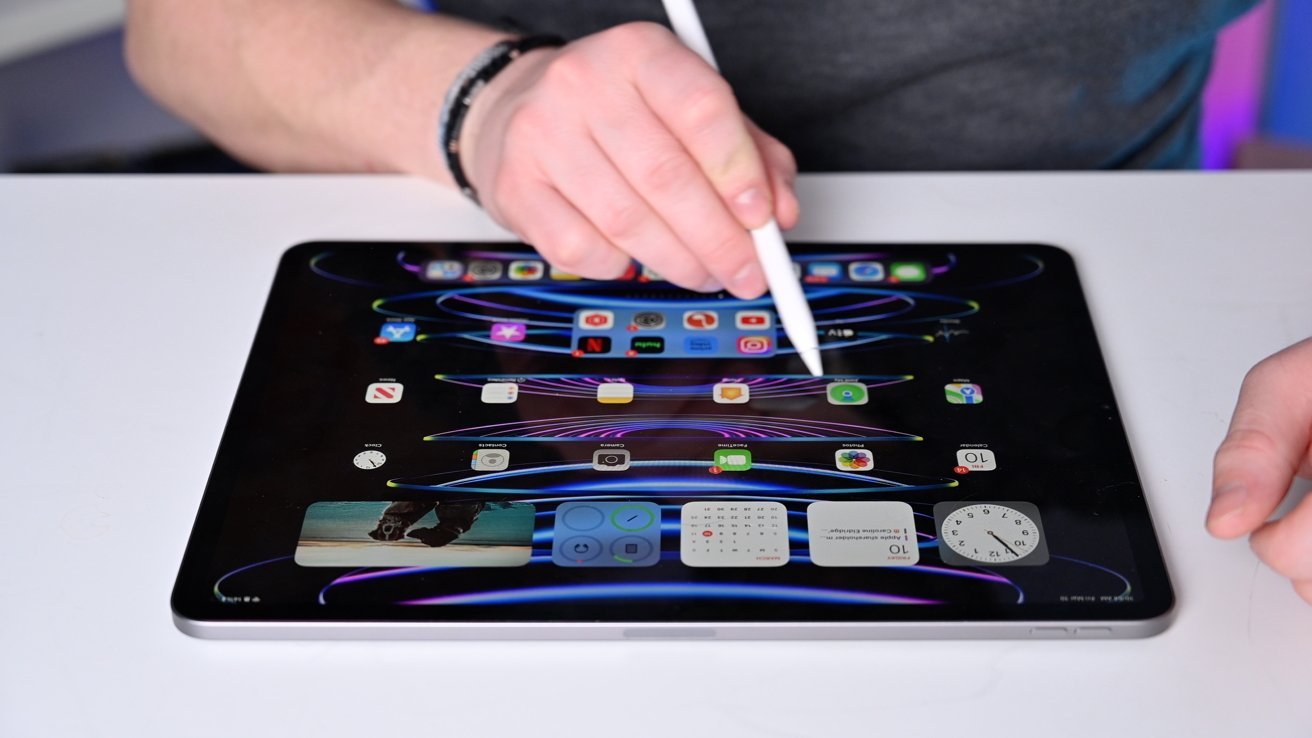Apple's foldable iPad plans could also include a super-sized version twice the size of an iPad Pro, that could go on sale by 2028.

An iPad Pro and Apple Pencil
Apple is long rumored to be creating some form of foldable iPad, in what could be a brand new form factor for the company. The latest report into the concept now has Apple working on an extremely large version, which could potentially turn itself into an impromptu MacBook.
In Sunday's "Power On" newsletter from Bloomberg, it is claimed that Apple has designed a giant foldable iPad that is approximately the size of two iPad Pro tablets side-by-side. The large display needs to be a foldable because carrying around a tablet with a screen close to 20 inches in diagonal would be difficult for most users.
This foldable approach could result in a large book-like design, that could effectively act as a giant notebook computer with a screen instead of a keyboard and trackpad. This would be somewhat similar to the failed Microsoft Courier and Surface Neo, as well as the Lenovo Yoga Book 9i.
Apple's version will supposedly run on iPadOS or a similar variant, and it won't be a "true iPad-Mac hybrid" according to the report, but it will have elements from both worlds. Apple has repeatedly insisted it doesn't intend to merge the iPad and Mac product lines into a single product category.
A release sometime in 2028 matches up with other recent claims on the topic. A display roadmap shared on December 5 mentioned an Apple foldable device out in 2028, equipped with a foldable OLED and RGB Tandem display, and an 18.8-inch size.
The 18.8-inch screen is practically the same diagonal measurement you get if you put two 13-inch iPad Pro displays next to each other, and measured, corner-to-corner. Previous rumors have also suggested a 20-inch screen for this.
Going down this approach makes sense, as it would effectively result in a foldable iPad with the same screen size as a 13-inch MacBook, and a similar overall size too.
Apple has previously been reported to be working on a foldable iPad for 2026, a much smaller model with an 8-inch display.
There have been theories that this initial foldable tablet could actually be similar to the iPad mini in size. It's also plausible that a device like the iPhone Fold could offer iPhone-like usage when folded, but expands to an iPad-like screen when unfolded.
The super-sized folded iPad could have a few uses, including offering a much larger iPad workspace to use while on the move. It may also act more like a MacBook replacement, without necessarily requiring users to carry around a Magic Keyboard too.
The report suggests that it won't be running macOS, but rather a hybrid iPadOS operating system of some kind. It's likely too early to be accurate about this aspect of the product yet.
Long-time design
As usual for Apple, it has spent a lot of time coming up with ideas for future products and services, and the ideas from the report have cropped up in the past. Chiefly this is done via patent filings and applications.
An image from an Apple patent for a foldable iPad display
It has been granted patents in the past for devices using a hinged OLED screen. This effectively turns a giant iPad into a MacBook, with the lower display able to be repurposed as a keyboard and trackpad area, and the upper section used like a MacBook display.
The lower display, when used in this folded mode, could provide context-sensitive controls that change depending on the app being used. For example, switching to a large trackpad area for stylus usage in art programs.
There have been repeated proposals for a "keyless keyboard" using a dual-screen approach, replacing the keyboard with a display using force-sensing and haptic feedback. The software keyboard could change layouts, depending on the user's preference.
For example, a user may need to use a different key layout depending on the language they are typing. Users may also elect to switch layouts to a more ergonomic version, changing their hand positions without needing to change any physical hardware.
It also doesn't have to be a flat key-less display, either. Another filing mentions the use of raised "key" sections on a display panel.
Using raised key sections, users will have a more tactile feel for the keys than they would with a flat glass panel, as is the case for existing display typing. It's plausible that these raised keys could be temporary, with the use of actuators to change the physical shape of the screen's surface.
